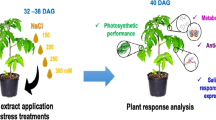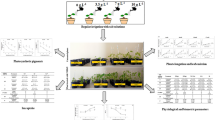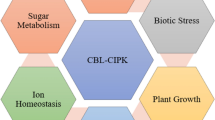Abstract
Soil salinity has been one of the significant barriers to improving rice production and quality. According to reports, Bacillus spp. can be utilized to boost plant development in saline soil, although the molecular mechanisms behind the interaction of microbes towards salt stress are not fully known. Variations in rice plant protein expression in response to salt stress and plant growth-promoting rhizobacteria (PGPR) inoculations were investigated using a proteomic method and sodium dodecyl sulfate–polyacrylamide gel electrophoresis (SDS-PAGE). Findings revealed that 54 salt-responsive proteins were identified by mass spectrometry analysis (LC–MS/MS) with the Bacillus spp. interaction, and the proteins were functionally classified as gene ontology. The initial study showed that all proteins were labeled by mass spectrometry analysis (LC–MS/MS) with Bacillus spp. interaction; the proteins were functionally classified into six groups. Approximately 18 identified proteins (up-regulated, 13; down-regulated, 5) were involved in the photosynthetic process. An increase in the expression of eight up-regulated and two down-regulated proteins in protein synthesis known as chaperones, such as the 60 kDa chaperonin, the 70 kDa heat shock protein BIP, and calreticulin, was involved in rice plant stress tolerance. Several proteins involved in protein metabolism and signaling pathways also experienced significant changes in their expression. The results revealed that phytohormones regulated the manifestation of various chaperones and protein abundance and that protein synthesis played a significant role in regulating salt stress. This study also described how chaperones regulate rice salt stress, their different subcellular localizations, and the activity of chaperones.









Similar content being viewed by others
Data availability
All data that support the findings of this study were included in this manuscript.
References
Agrios GN (2005) Plant Pathology, Department of Plant Pathology University of Florida, 5th edn. Elsevier Academic Press, California, USA, p 635. https://www.slideshare.net/FLAVIAFERNANDESRIBEI/agrios-2005-plant-pathology-5-edpdf
Ali M, Ahmad Z, Ashraf MF, Dong W (2021) Maize endophytic microbial communities revealed by removing PCR and 16S rRNA sequencing and their synthetic applications to suppress maize banded leaf and sheath blight. Microbiol Res 242:126639. https://doi.org/10.1016/j.micres.2020.126639
Ali M, Ali Q, Sohail MA, Ashraf MF, Saleem MH, Hussain S (2021) Diversity and taxonomic distribution of endophytic bacterial community in the rice plant and its prospective. Int J Mol Sci 22:10165. https://doi.org/10.3390/ijms221810165
Ali-Tan KZ, Radziah O, Halimi MS, Rahim KBA, Abdullah MZ, Shamsuddin ZH (2017) Growth and yield responses of rice cv. MR219 to rhizobial and plant growth-promoting rhizobacterial inoculations under different fertilizer-N rates. Bangladesh J Bot 46(1):481–488
Ashik MFM, Aminul IM, Hassan MR, Sanjoy KM, Manish K, Prosun B, Firoz A (2023) Effects of halotolerant rhizobacteria on rice seedlings under salinity stress. Sci Total Environ 892:163774. https://doi.org/10.1016/j.scitotenv.2023.163774
Avni A, Edelman M, Rachailovich I, Aviv D, Fluhr R (1989) A point mutation in the glutathione peroxidase activity from Arabidopsis thaliana: molecular cloning and functional characterization. Eur J Biochem 216:579–858
Barkla BJ, Vera-Estrella R, Hernandez-Coronado M, Pantoja O (2009) Quantitative proteomics of the tonoplast reveals a role for glycolytic enzymes in salt tolerance. Plant Cell 21:4044–4058. https://doi.org/10.1105/tpc.109.069211
Boutte CC, Crosson S (2013) Bacterial lifestyle shapes stringent response activation. Trends Microbiol 21(4):174–180. https://doi.org/10.1016/j.tim.2013.01.002
Bradford MM (1976) A rapid and sensitive method for the quantitation of microgram quantities of protein utilizing the principle of protein–dye binding. Anal Biochem 72:248–254
Bredow M, Monaghan J (2019) Regulation of plant immune signaling by calcium-dependent protein kinase. Mol Plant Microbe Interact 32(1):6–19. https://doi.org/10.1094/MPMI-09-18-0267-FI
Chen M, Ni L, Chen J, Sun S, Qin C, Zhang G, Zhang A, Jiang M (2021) Rice calcium/calmodulin-dependent protein kinase directly phosphorylates a mitogen-activated protein kinase to regulate abscisic acid responses. Plant Cell 33:1790–1812. https://doi.org/10.1093/plcell/koab071
Du N, Shi L, Yuan Y, Li B, Shu S, Sun J, Guo S (2016) Proteomic analysis reveals the positive roles of the plant-growth-promoting rhizobacterium NSY50 in the response of cucumber roots to Fusarium oxysporum f. sp. cucumerinum inoculation. Front Plant Sci 7:1859. https://doi.org/10.3389/fpls.2016.01859
Dumanovic J, Nepovimova E, Natic M, Kuca K, Jacevic V (2021) The significance of reactive oxygen species and antioxidant defense system in plants: a concise overview. Front Plant Sci 11:552969. https://doi.org/10.3389/fpls.2020.552969
El-Esawi MA, Alaraidh IA, Alsahli AA, Alzahrani SM, Ali HM, Alayafi AA, Ahmad M (2018) Serratia liquefaciens KM4 improves salt stress tolerance in maize by regulating redox potential, ion homeostasis, leaf gas exchange and stress-related gene expression. Int J Mol Sci 19:3310. https://doi.org/10.3390/ijms19113310
Gagne A, Bourque F, Bertrand A, Claessens A, Aliferis KA, Jabaji S (2016) Alleviation of drought stress and metabolic changes in timothy (Phleum pratense L.) colonized with Bacillus subtilis B26. Front Plant Sci 7:584. https://doi.org/10.3389/fpls.2016.00584
Gao Y, Zou H, Wang B, Yuan F (2022) Progress and applications of plant growth-promoting bacteria in salt tolerance of crops. Int J Mol Sci 23(13):7036. https://doi.org/10.3390/ijms23137036
Gong DH, Wang GZ, Si WT (2018) Effects of salt stress on photosynthetic pigments and activity of ribulose-1,5-bisphosphate carboxylase/oxygenase in Kalidium foliatum. Russ J Plant Physiol 65:98–103. https://doi.org/10.1134/S1021443718010144
Gugger PF, Penaloza-Ramırez JM, Wright JW, Sork VL (2017) Whole-transcriptome response to water stress in a California endemic oak, Quercus lobata. Tree Physiol 37:632–644. https://doi.org/10.1093/treephys/tpw122
Haroon U, Munis MFH, Liaquat F, Khizar M, Elahi M, Chaudhary HJ (2023) Biofilm formation and flocculation potential analysis of halotolerant Bacillus tequilensis and its inoculation in soil to mitigate salinity stress of chickpea. Physiol Mol Biol Plants 29:277–288. https://doi.org/10.1007/s12298-023-01280-1
Hartl FU, Hlodan R, Langer T (1994) Molecular chaperones in protein folding: the art of avoiding sticky situations. Trends Biochem Sci 19:20–25
Hassan A, Amjad SF, Saleem MH, Yasmin H, Imran M, Riaz M (2021) Foliar application of ascorbic acid enhances salinity stress tolerance in barley (Hordeum vulgare L.) through modulation of morpho-physio-biochemical attributes, ions uptake, osmo-protectants and stress response genes expression. Saudi J Biol Sci 28:4276–4290. https://doi.org/10.1016/j.sjbs.2021.03.045
Ilangumaran G, Subramanian S, Smith DL (2022) Soybean leaf proteomic profile influenced by rhizobacteria under optimal and salt stress conditions. Front Plant Sci 13:809906. https://doi.org/10.3389/fpls.2022.809906
Jogawat A (2019) Osmolytes and their role in abiotic stress tolerance in plants. In: Roy Choudhury A, Tripathi D (eds) Molecular plant abiotic stress: biology and biotechnology. Wiley, Hoboken, NJ, USA, pp 91–104
Joshi R, Paul M, Kumar A, Pandey D (2019) Role of calreticulin in biotic and abiotic stress signaling and tolerance mechanisms in plants. Gene 714:144004. https://doi.org/10.1016/j.gene.2019.144004
Ke J, Wang B, Yoshikuni Y (2020) Microbiome engineering: synthetic biology of plant-associated microbiomes in sustainable agriculture. Trends Biotechnol 39:244–261. https://doi.org/10.1016/j.tibtech.2020.07.008
Khan MA, Hamayun M, Asaf S, Khan M, Yun BW, Kang SM, Lee IJ (2021) Rhizospheric Bacillus spp. rescues plant growth under salinity stress via regulating gene expression, endogenous hormones, and antioxidant system of Oryza sativa L. Front Plant Sci 12:665590. https://doi.org/10.3389/fpls.2021.665590
Khan MA, Sahile AA, Jan R, Asaf S, Hamayun M, Imran M, Adhikari A, Kang SM, Kim KM, Lee IJ (2021) Halotolerant bacteria mitigate the effects of salinity stress on soybean growth by regulating secondary metabolites and molecular responses. BMC Plant Biol 21:176. https://doi.org/10.1186/s12870-021-02937-3
Kosova K, Vitamvas P, Prasil IT, Renaut J (2011) Plant proteome changes under abiotic stress-contribution of proteomics studies to understanding plant stress response. J Proteomics 74(8):1301–1322. https://doi.org/10.1016/j.jprot.2011.02.006
Kumar A, Singh S, Gaurav AK, Srivastava S (2020) Plant growth-promoting bacteria: biological tools for the mitigation of salinity stress in plants. Front Microbiol 11:1216. https://doi.org/10.3389/fmicb.2020.01216
Ladeiro B (2012) Saline agriculture in the 21st century: using salt contaminated resources to cope food requirements. J Bot 2012:310705. https://doi.org/10.1155/2012/310705
Laemmli UK (1970) Nature 227:680–685
Li J, Mahajan A, Tsai MD (2006) Ankyrin repeat: a unique motif mediating protein-protein interactions. Biochem 45:15168–15178. https://doi.org/10.1021/bi062188q
Liu W, Tang X, Zhu X, Qi X, Zhang N, Si H (2019) Genome-wide identification and expression analysis of the E2 gene family in potato. Mol Biol Rep 46:777–791. https://doi.org/10.1007/s11033-018-4533-9
Mendlovic F, Conconi M (2010) Calreticulin: a multifaceted protein. Nature Education 4(1):1
Ni E, Zhou L, Li J, Jiang D, Wang Z, Zheng S, Qi H, Zhou Y, Wang C, Xiao S, Liu Z, Zhou H, Zhuang C (2018) OsCER1 plays a pivotal role in very-long-chain alkane biosynthesis and affects plastid development and programmed cell death of tapetum in rice (Oryza sativa L.). Front Plant Sci 9:1217. https://doi.org/10.3389/fpls.2018.01217
Nohzadeh MS, Habibi RM, Heidari M, Salekdeh GH (2007) Proteomics reveals new salt responsive proteins associated with rice plasma membrane. Biosci Biotechnol Biochem 71(9):2144–2154. https://doi.org/10.1271/bbb.70027
Nuchanat W, Suntareeya B, Teerapong B (2011) Cloning and characterization of catalase from Rice, Oryza sativa L. Biosci Biotechnol Biochem 75(10):1900–190. https://doi.org/10.1271/bbb.110214
Parker R, Flowers TJ, Moore AL, Harpham NVJ (2006) An accurate and reproducible method for proteome profiling of the effects of salt stress in the rice leaf lamina. J Exp Bot 57:1109–1118. https://doi.org/10.1093/jxb/erj134
Paul D, Nair S (2008) Stress adaptations in a plant growth promoting rhizobacterium (PGPR) with increasing salinity in the coastal agricultural soils. J Basic Microbiol 48:378–384. https://doi.org/10.1002/jobm.200700365
Paulina GAA, Sobeida SN (2017) Plant hexokinases are multifaceted proteins. Plant Cell Physiol 58(7):1151–1160. https://doi.org/10.1093/pcp/pcx062
Polge C, Jaquinod M, Holzer F, Bourguignon J, Walling L, Brouquisse R (2009) Evidence for the existence in Arabidopsis thaliana of the proteasome proteolytic pathway: activation in response to cadmium. J Biol Chem 284:35412–35424. https://doi.org/10.1074/jbc.M109.035394
Qian Z, Lujian Z, Jianchao L, Zhenzhen C, Xiaoxia D, Fudeng H, Gang P, Fangmin C (2018) Involvement of CAT in the detoxification of HT-induced ROS burst in rice anther and its relation to pollen fertility. Plant Cell Rep 37:741–757. https://doi.org/10.1007/s00299-018-2264-y
Qin C, Cheng L, Zhang H, He M, Shen J, Zhang Y, Wu P (2016) OsGatB, the subunit of tRNA-dependent amidotransferase, is required for primary root development in rice. Front Plant Sci 7:599. https://doi.org/10.3389/fpls.2016.00599
Rahman MA, Alam I, Kim YG, Ahn NY, Heo SH, Lee DG, Liu G, Lee BH (2015) Screening for salt-responsive proteins in two contrasting alfalfa cultivars using a comparative proteome approach. Plant Physiol Biochem 89:112–122. https://doi.org/10.1016/j.plaphy.2015.02.015
Rochester DE, Winer JA, Shah DM (1986) The structure and expression of maize genes encoding the major heat shock protein hsp70. EMBO 5:451–458
Sambrook J, Fristsch EF, Maniatis T (1989) Molecular cloning: a laboratory manual, 2nd edn. Cold Spring Harbor Laboratory Press, Cold Spring Harbor, New York, USA
Sharma IP, Sharma A (2017) Physiological and biochemical changes in tomato cultivar PT-3 with dual inoculation of mycorrhiza and PGPR against root-knot nematode. Symbiosis 71(3):175–183. https://doi.org/10.1007/s13199-016-0423-x
Shrivastava P, Kumar R (2015) Soil salinity: a serious environmental issue and plant growth promoting bacteria as one of the tools for its alleviation. Saud J Biol Sci 22(2):123–131. https://doi.org/10.1016/j.sjbs.2014.12.001
Shultana R, Kee-Zuan AT, Yusop MR, Saud HM, El-Shehawi AM (2021) Bacillus tequilensis strain ‘UPMRB9’ improves biochemical attributes and nutrient accumulation in different rice varieties under salinity stress. PLoS ONE 16(12):e0260869. https://doi.org/10.1371/journal.pone.0260869
Sirajuddin Khan A, Ali L, Chaudhary HJ, Munis FH, Bano A, Masood S (2016) Bacillus pumilus alleviates boron toxicity in tomato (Lycopersicum esculentum L.) due to enhanced antioxidant enzymatic activity. Sci Hortic 200:178–185. https://doi.org/10.1016/j.scienta.2016.01.024
Solangi ZA, Ali Q, Soomro ZA, Saleem MH, Rattar TM (2021) Effects of drought stress on morphological, physiological traits of wheat (Triticum aestivum L.) cultivars in Pakistan. J Plant Physiol Pathol 9:3
String Consortium (2023) https://string-db.org/network/3702.AT1G14240.2. Accessed 9 Jul 2023
Surabhi A, Chauhan R, Indoliya Y, Singh AC, Kumar SM, Agrawal L, Dwivedi S, Naresh SS, Srivastava S, Poonam CS, Singh PC, Chakrabarty D, Srivastava S, Deo RT (2021) Microbial consortium mediated growth promotion and arsenic reduction in rice: an integrated transcriptome and proteome profiling. Ecotoxicol Environ Saf 228:113004. https://doi.org/10.1016/j.ecoenv.2021.113004
Wang M, Xu Z, Kong Y (2018) The tubby-like proteins kingdom in animals and plants. Gene 642:16–25. https://doi.org/10.1016/j.gene.2017.10.077
Willey DL, Howe CJ, Auffret AD, Bowman CM, Dyer TA, Gray JC (1984) Location and nucleotide sequence of the gene for cytochrome f in wheat chloroplast DNA. MGG 194(3):416–422
Xu H, Gao J, Portieles R, Du L, Gao X, Borras-Hidalgo O (2022) Endophytic bacterium Bacillus aryabhattai induces novel transcriptomic changes to stimulate plant growth. PLoS ONE 17(8):e0272500. https://doi.org/10.1371/journal.pone.0272500
Yuan Y, Zhong S, Li Q, Zhu Z, Lou Y, Wang L, Wang J, Wang M, Li Q, Yang D, He Z (2007) Functional analysis of rice NPR1-like genes reveals that OsNPR1/NH1 is the rice orthologue conferring disease resistance with enhanced herbivore susceptibility. Plant Biotechnol J 5(2):313–324. https://doi.org/10.1111/j.1467-7652.2007.00243.x
Yuhta N, Akira N, Yuzuru T (2014) Biochemical analyses of ppGpp effect on adenylosuccinate synthetases, key enzymes in purine biosynthesis in rice. Biosci Biotechnol Biochem 78(6):1022–1025. https://doi.org/10.1080/09168451.2014.910103
Zang X, Komatsu S (2007) A proteomics approach for identifying osmotic-stress-related proteins in rice. Phytochemistry 68:426–437. https://doi.org/10.1016/j.phytochem.2006.11.005
Zhang H, Wang WQ, Liu SJ, Moller IM, Song SQ (2015) Proteome analysis of poplar seed vigor. PLoS One 10:e0132509. https://doi.org/10.1371/journal.pone.0132509
Zhao Y, Zhang F, Mickan B, Wang D, Wang W (2022) Physiological, proteomic, and metabolomic analysis provide insights into Bacillus sp.-mediated salt tolerance in wheat. Plant Cell Rep 41:95–118. https://doi.org/10.1007/s00299-021-02788-0
Zhou GA, Chang RZ, Qiu LJ (2010) Overexpression of soybean ubiquitin-conjugating enzyme gene GmUBC2 confers enhanced drought and salt tolerance through modulating abiotic stress-responsive gene expression in Arabidopsis. Plant Mol Biol 72:357–367. https://doi.org/10.1007/s11103-009-9575-x
Acknowledgements
The first author expresses her appreciation to the Organization for Women in Science for Developing World (OWSD), SIDA (Swedish International Development Cooperation Agency), and The World Academy of Sciences (TWAS) for the prestigious fellowship award.
Funding
The Fundamental Research Grant Scheme (FRGS) (FRGS/1/2020/STG01/UPM/02/6) by the Ministry of Higher Education, Malaysia and Putra Grant (GP-IPS/2022/9709700) by the Universiti Putra Malaysia.
Author information
Authors and Affiliations
Contributions
ATKZ: conceptualization, methodology, validation, formal analysis, investigation, writing—original draft, writing—review and editing, visualization, supervision, project administration, and funding acquisition; SSC: conceptualization, methodology, software, validation, formal analysis, investigation, resources, data curation, writing—original draft, writing—review and editing, and visualization; AMA: conceptualization, supervision, and funding acquisition; TGH: conceptualization, supervision, and funding acquisition; AHAG: conceptualization and supervision; BMS: resources and data curation; AA: resources and data curation; MER: software; HOR: software, writing—review and editing, and visualization.
Corresponding author
Ethics declarations
Competing interests
The authors declare no competing interests.
Conflict of interest
The authors declare no competing interests.
Additional information
Publisher's Note
Springer Nature remains neutral with regard to jurisdictional claims in published maps and institutional affiliations.
Rights and permissions
Springer Nature or its licensor (e.g. a society or other partner) holds exclusive rights to this article under a publishing agreement with the author(s) or other rightsholder(s); author self-archiving of the accepted manuscript version of this article is solely governed by the terms of such publishing agreement and applicable law.
About this article
Cite this article
Chompa, S.S., Zuan, A.T.K., Amin, A.M. et al. Growth and protein response of rice plant with plant growth-promoting rhizobacteria inoculations under salt stress conditions. Int Microbiol (2024). https://doi.org/10.1007/s10123-023-00469-4
Received:
Revised:
Accepted:
Published:
DOI: https://doi.org/10.1007/s10123-023-00469-4




